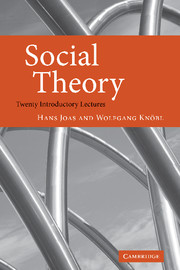Book contents
- Frontmatter
- Dedication
- Contents
- Introduction
- I What is theory?
- II The classical attempt at synthesis: Talcott Parsons
- III Parsons on the road to normativist functionalism
- IV Parsons and the elaboration of normativist functionalism
- V Neo-utilitarianism
- VI Interpretive approaches (1): symbolic interactionism
- VII Interpretive approaches (2): ethnomethodology
- VIII Conflict sociology and conflict theory
- IX Habermas and critical theory
- X Habermas' ‘theory of communicative action’
- XI Niklas Luhmann's radicalization of functionalism
- XII Anthony Giddens' theory of structuration and the new British sociology of power
- XIII The renewal of Parsonianism and modernization theory
- XIV Structuralism and poststructuralism
- XV Between structuralism and theory of practice: The cultural sociology of Pierre Bourdieu
- XVI French anti-structuralists (Cornelius Castoriadis, Alain Touraine and Paul Ricoeur)
- XVII Feminist social theories
- XVIII A crisis of modernity? New diagnoses (Ulrich Beck, Zygmunt Bauman, Robert Bellah, and the debate between liberals and communitarians)
- XIX Neo-pragmatism
- XX How things stand
- References
- Author index
- Subject index
I - What is theory?
Published online by Cambridge University Press: 05 June 2014
- Frontmatter
- Dedication
- Contents
- Introduction
- I What is theory?
- II The classical attempt at synthesis: Talcott Parsons
- III Parsons on the road to normativist functionalism
- IV Parsons and the elaboration of normativist functionalism
- V Neo-utilitarianism
- VI Interpretive approaches (1): symbolic interactionism
- VII Interpretive approaches (2): ethnomethodology
- VIII Conflict sociology and conflict theory
- IX Habermas and critical theory
- X Habermas' ‘theory of communicative action’
- XI Niklas Luhmann's radicalization of functionalism
- XII Anthony Giddens' theory of structuration and the new British sociology of power
- XIII The renewal of Parsonianism and modernization theory
- XIV Structuralism and poststructuralism
- XV Between structuralism and theory of practice: The cultural sociology of Pierre Bourdieu
- XVI French anti-structuralists (Cornelius Castoriadis, Alain Touraine and Paul Ricoeur)
- XVII Feminist social theories
- XVIII A crisis of modernity? New diagnoses (Ulrich Beck, Zygmunt Bauman, Robert Bellah, and the debate between liberals and communitarians)
- XIX Neo-pragmatism
- XX How things stand
- References
- Author index
- Subject index
Summary
Our decision to begin this lecture series on modern social theory with the question ‘What is theory?’ may raise some eyebrows. After all, a fair number of you have attended courses on the great figures of sociological theory – such as Emile Durkheim, George Herbert Mead and Max Weber – which featured no discussion of the ‘nature’ of theory. The course organizers rightly assumed that you already have an intuitive understanding of ‘theory’ or soon will have. At any rate, you should by now be in a position to characterize the quite different approaches to social reality taken by Weber, Mead or Durkheim. As is well known, Weber described the state or political phenomena from a completely different point of view from Durkheim; the former thus had a quite different theoretical conception of the nature of the political from the latter, though both referred to the same empirical facts in their sociological accounts. Mead's conception of social action clearly differed markedly from that of Weber, though some of the terms they used were similar, and so on. All these authors thus underpinned their sociological accounts with differing theories (plural!). But has this insight not brought us a decisive step closer to resolving the issue of the ‘nature’ of theory? If we were to compare all these theories and pin down what they have in common, thus finding the lowest common denominator, would we not, we might wonder, already have achieved an adequate understanding of theory (singular!)? A comparison of this kind would surely provide us with, as it were, the formal elements that make up a (sociological) theory; we could grasp what social theory in fact is.
- Type
- Chapter
- Information
- Social TheoryTwenty Introductory Lectures, pp. 1 - 19Publisher: Cambridge University PressPrint publication year: 2009



